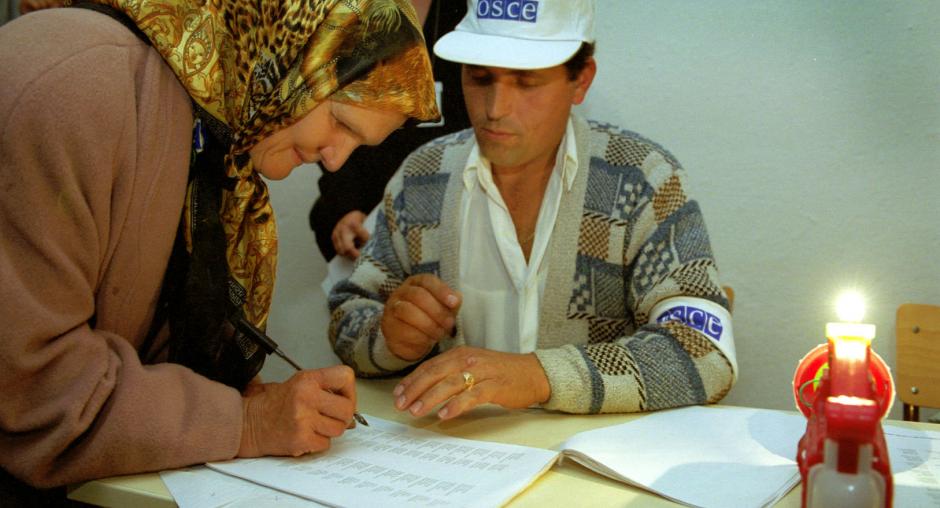Newsroom
Delays in Kosovo election preparations raise concerns
PRISTINA 26 October 2001

The Kosovo-wide election is scheduled for 17 November 2001. (Lubomir Kotek/OSCE) Photo details
PRISTINA, 26 October 2001 (OSCE) - The OSCE Mission in Kosovo is deeply concerned - concerns which are fully shared by the United Nations Interim Administration Mission in Kosovo - that Federal Republic of Yugoslavia (FRY) authorities have not yet authorized technical preparations for the Kosovo Assembly Election Day on 17 November.
With only 22 days until the Election, operational preparations should have started long ago, independent of the political decision whether or not to endorse participation in the election. The FRY authorities are placing an enormous burden on the OSCE Mission in Kosovo to prepare for internationally acceptable voting.
"We definitely need the green light from the government in Belgrade, to allow us to get ready," said OSCE Head of Mission, Ambassador Daan Everts. "As each day passes it is harder for us to prepare a good election; we are now getting very concerned that the 100,000 people who are eligible to vote in Serbia and Montenegro will be disenfranchised, because Belgrade is delaying our start."
Ambassador Everts joined the UN Special Representative of the Secretary General, Hans Haekkerup in meetings with Yugoslav president Vojoslav Kostunica and Serb Deputy Prime Minister Nebojsa Covic yesterday. While the talks were regarded as generally constructive, they did not provide the OSCE Mission in Kosovo with the approval to start work on election preparation.
In established democracies with set procedures, polling locations, and polling staff, elections typically require at least one month to organize. The OSCE Mission in Kosovo, working with FRY authorities such as the Commissariats for Refugees, must identify polling locations, recruit polling staff, and train the polling staff in the rules and procedures adopted by the Kosovo Central Election Commission. These arrangements must be sufficient to serve more than 100,000 voters in 100 Polling Centres, which will house 191 Polling Stations. Some Polling Centres will serve as many as 7,000 voters, requiring extensive queue control planning.
If work does not start soon there may be a number of severe consequences, such as:
The OSCE Mission in Kosovo is seeking to provide additional staff and resources to mitigate as many of these problems as possible. But ultimately, these problems may undermine the credibility of the electoral process, especially if the vote out-of-Kosovo does not achieve the same high technical standards expected within Kosovo.
The OSCE Mission in Kosovo urges FRY authorities to allow operational preparations to begin without any further delay.
Such preparations will in no way commit the FRY authorities to endorsing the electoral process or Kosovo Serb voters to voting on Election Day. But, without these preparations, those people who do wish to exercise their right to vote for the Kosovo Assembly will not be able to do so.
With only 22 days until the Election, operational preparations should have started long ago, independent of the political decision whether or not to endorse participation in the election. The FRY authorities are placing an enormous burden on the OSCE Mission in Kosovo to prepare for internationally acceptable voting.
"We definitely need the green light from the government in Belgrade, to allow us to get ready," said OSCE Head of Mission, Ambassador Daan Everts. "As each day passes it is harder for us to prepare a good election; we are now getting very concerned that the 100,000 people who are eligible to vote in Serbia and Montenegro will be disenfranchised, because Belgrade is delaying our start."
Ambassador Everts joined the UN Special Representative of the Secretary General, Hans Haekkerup in meetings with Yugoslav president Vojoslav Kostunica and Serb Deputy Prime Minister Nebojsa Covic yesterday. While the talks were regarded as generally constructive, they did not provide the OSCE Mission in Kosovo with the approval to start work on election preparation.
In established democracies with set procedures, polling locations, and polling staff, elections typically require at least one month to organize. The OSCE Mission in Kosovo, working with FRY authorities such as the Commissariats for Refugees, must identify polling locations, recruit polling staff, and train the polling staff in the rules and procedures adopted by the Kosovo Central Election Commission. These arrangements must be sufficient to serve more than 100,000 voters in 100 Polling Centres, which will house 191 Polling Stations. Some Polling Centres will serve as many as 7,000 voters, requiring extensive queue control planning.
If work does not start soon there may be a number of severe consequences, such as:
- Voters will not know where to vote;
- Polling Centres will not be able to process large numbers of voters, resulting in confusion and disorder;
- Polling staff will not know how to process voters, potentially leading to eligible voters not being permitted to vote or to ineligible voters being permitted to vote;
- Sensitive materials may be mishandled or lost.
The OSCE Mission in Kosovo is seeking to provide additional staff and resources to mitigate as many of these problems as possible. But ultimately, these problems may undermine the credibility of the electoral process, especially if the vote out-of-Kosovo does not achieve the same high technical standards expected within Kosovo.
The OSCE Mission in Kosovo urges FRY authorities to allow operational preparations to begin without any further delay.
Such preparations will in no way commit the FRY authorities to endorsing the electoral process or Kosovo Serb voters to voting on Election Day. But, without these preparations, those people who do wish to exercise their right to vote for the Kosovo Assembly will not be able to do so.
